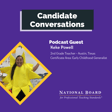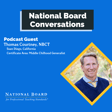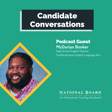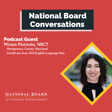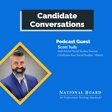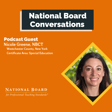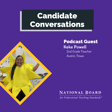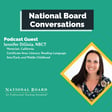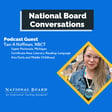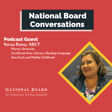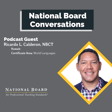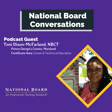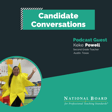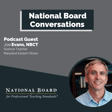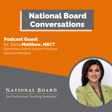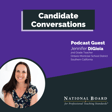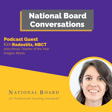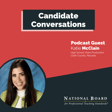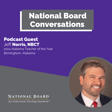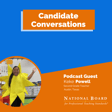Become a Creator today!Start creating today - Share your story with the world!
Start for free
00:00:00
00:00:01

Elevating Practice: Navigating the National Board Certification with Michele Vicino-Coleman
This episode of the podcast delves into the power of reflective practice with educator Michele Vicino-Coleman. Michele guides us through her National Board Certification journey, emphasizing how the process encourages teachers to analyze their instructional decisions, understand their students deeply, and articulate the 'why' behind their teaching. Explore how Michele connects this reflective work to her teaching of English and theater, and discover how certification can be a transformative experience for professional growth
Transcript
Introduction and Guest's Background
00:00:04
Speaker
Hi, and welcome back to Candidate Conversations with the National Board. I'm your host Danielle Brown, and I am so excited to hear from such a dynamic educator today.
00:00:15
Speaker
We do a little like pre-prep meeting and I to listen in. And can I just say that our guest today has so many experiences, has such a passion for the profession, and I can't wait to dive in So without further ado, Michelle, I'm gonna turn it over to you.
00:00:32
Speaker
Let's with an introduction, how you came to teaching, what are you currently teaching? Take it away. Excellent. Yes, this is such a cool opportunity.
Teaching Subjects and Schedule
00:00:43
Speaker
I am teaching honors English ninth grade, Ivy language and literature, and then a combined section of Ivy theater with high school theater students. And I've been able to keep that schedule for a couple of years now. So I'm at a point in my career where and not only do I really enjoy what I'm doing, but I've been able to be blessed with the consistency to ah fine tune those skills and really get to know the curriculum and do different things with it. So I felt like I was kind of ready in that endpoint in point my career for a challenge. So here we are.
00:01:21
Speaker
I'm so excited about that. and we're gonna dive deeper into some of those um topics that you talked about as far as like what you teach, because I think the theater strand is so interesting and like how you got there, but that's because I have insider information.
00:01:35
Speaker
So with that, I'm so curious, like how did you come to teaching? Like, were you always going to be a teacher? Is it something that you were like, at the age of five, I knew I wanted to be in the service of students?
Journey to Teaching
00:01:48
Speaker
It was kind of like that. There was defining moment, you could say, in my life. In high school, i was always involved with different things in the community and church and opportunities to babysit and just be around younger children And I really enjoyed it and I kind of had a natural knack for it. So in high school, there was an internship program in the child development program that allowed me to explore that on a more professional level.
00:02:20
Speaker
So I took some of the classes that were offered at my high school. And then by senior year, I was able to have a half day schedule and travel to the elementary school that I went to for third, fourth and fifth grade.
00:02:34
Speaker
And did an internship in a third grade classroom and work alongside of teach a teacher. And so when I went into college, I was still not quite sure I had a lot of science.
00:02:48
Speaker
but Like I enjoyed anatomy and physiology. And again, the people centered profession of nursing was my was my other. passion, I guess you could say. And so I declared a nursing major and my first week of college, I went to one set of all of my classes over the course of three days. And I was like, no, I definitely am and not.
00:03:10
Speaker
This is not where I need to be. I just felt like the teaching was where I needed to be. So I went and changed my major and the rest is history. And it was actually elementary education. So, yeah, my original certification is first through eighth grade, every subject.
00:03:27
Speaker
And coming to high school was oh an unforeseen part of that journey. I don't know. Do you want to get into that now? always want to get into that because as a like through and through, I am an elementary teacher. I thought I was going to go in and teach like middle grades, but most of my career was in K-2, specifically in kindergarten.
00:03:51
Speaker
And when people say like, oh, yeah have a high school teacher or a middle school teacher, I'm always so curious. Like, how did you know that was a fit for you? And then I have another level of when someone says i was an elementary teacher and i chose whether like actually chosen or circumstances put me in high school.
00:04:09
Speaker
I'm like, wait, what? Because I couldn't. Yeah. Elementary through and through. So I'm so curious. How did you make that decision? What brought you to high school and similarities or differences maybe?
00:04:20
Speaker
Yeah, I actually have theater to thank for that. So your previous inquiry loops in perfectly. So elementary education, just because that's the the age of the student that I had the most experience with and I.
00:04:35
Speaker
just pictured myself as an elementary school teacher. So I started my career in fourth grade and then did a little fifth and sixth grade because the sixth grade was in the elementary school. But then shortly into my career, I've always been in the performing arts. I minored in music.
00:04:51
Speaker
I did theater all growing up. And I realized I had hit my professional, you know, a part of my life and something was missing. I really did. And that the arts and theater in particular was something that I needed to incorporate in my life. So I i asked myself, is this something that I'm going to do on the side for fun or what what is this going to look like?
Passion for Theater in Education
00:05:14
Speaker
So I started getting involved with um the little drama club at the elementary school and then some community theater programs.
00:05:23
Speaker
And then i did kind of a pre professional program, a dinner theater at a local college. And a lot of the people in it were high school and college kids who wanted to be professional actors, directors, dancers.
00:05:36
Speaker
And here I am, this elementary school teacher, you know, acting and singing and dancing alongside of them. And the music director of the production that I did was working at the school that I ended up getting my master's in. And it was such a unique program. There were only three like it in the country. It's a master of arts in theater education. wow Yeah, it was just two worlds colliding the best of both worlds, all of the things I was teaching elementary school and realized that I could, there were two kind of paths for people in this program. people like me still teaching element elementary school, but using arts integration as a technique in their own teaching and bringing the arts into it and exposing students that way, but also teaching theater as a curriculum and being a theater teacher. So that's the avenue that I, the that I took and in my current school district,
00:06:32
Speaker
Teaching theater, you it's not really an elementary school level thing. You're either in a high school or some local districts have middle school theater teachers, but I ended up going to high school to be a theater teacher.
00:06:44
Speaker
And then the pandemic happened. I was doing all kinds of things with theater and the performing arts. and I realized that I missed being in the the classroom after freelancing and i wanted to be in a place where I could get back to my roots but also be able to layer in the passion that I had for for theater and the arts and I loved the reading and the writing of being an elementary school teacher so it was a weird shift to be like i feel like high school
00:07:16
Speaker
English is another layer to all of this. And I've just fallen in love with it and got my certification in the area when I started teaching again. And now being able to teach IB theater as one of the classes has been an absolute joy and a pleasure. So that that's how all of that came to be.
00:07:36
Speaker
I love how it's so connected and almost seamless. And the whole time I just had the biggest smile on my face because I actually started my teaching career as an arts integration specialist at a K2 school and did not have like necessarily the training to do that. It was like a grant program. It was a way to get into the district.
00:07:57
Speaker
And they looked at my resume and they said, oh, you play clarinet? You can do arts integration. So anytime I hear people like using the arts in their work, it just looks so exciting to me because that was my foundation. I worked with teachers in the K2 grade band.
00:08:12
Speaker
We would figure out how to infuse arts and the content that they were teaching. And so the fact that you get to do this as your job is so cool. That is so cool. And I love how the transition was one that sounds like it was like full of joy. Like you got to do the thing that brought you joy as well as like continuing to teach students and engage them in some and a different way.
00:08:34
Speaker
yeah. So very cool. Thank you for taking us down that journey with you.
Board Certification Journey
00:08:39
Speaker
and so, of course, this podcast is all about having conversations with candidates, right? So we want to know more about you. we're also really interested in about how the journey, as we so lovingly call it, is impacting you. So before we go there, I'm so curious, um what has your journey been in board certification? Like, what have you submitted? Where did you start?
00:09:04
Speaker
What did you think of when someone was like, hey, have you heard of this national board certification you want in? Like all the things. So feel free. Yeah, I actually, it crossed my path way back when I was still teaching elementary school in the first couple of years.
00:09:19
Speaker
I remember the iteration of the board certification that included packing, physical papers in the box. yeah and the ah the I just remember teachers talking about the paper clipping of things and having the paper clip on the right side and not the left side and all of that. Let me tell you that that very detailed minutia of the submission has translated into the electronic.
00:09:47
Speaker
so It's still a crazy process. They've just made it like Arial 11 point font, double space, and you can't do this and that and the other. so Yeah, it crossed my path watching people go through it.
00:10:00
Speaker
And honestly, at that time, it just seemed like something that didn't need to happen necessarily in my life. I saw myself getting the master's degree and wanting to do that. And of course, there's incentives in my district for you know chain lane changes and and getting different, like a master's plus 30, master's plus 60. But but the national board wasn't necessarily in that trajectory for me.
00:10:29
Speaker
And then now like I said earlier, I've come to a point in my career where it's not necessarily like complacent or comfortable because as teachers, we never get to the that point. Even if you teach the same thing, you have different students and there's always different variables.
00:10:43
Speaker
But I felt like I was ready for a challenge, so to speak. And i already had my master's plus 30 and just taking classes. it just didn't seem like something worthwhile, I guess.
00:10:58
Speaker
So there were a couple teachers at my school who have recently gone through it and suggested it. And then of course there was the curriculum specialist that put me in touch with you guys who also said that it was something that she could see me doing and completing and excelling at. So I went ahead and dove in with both feet. And I know that there are people who do it in one year. And that just seemed absolutely crazy to me. I'm also a single mom of two beautiful boys and I live about 45 minutes, 55 minutes away from the school that I teach at. So there was also balance to be struck. So I decided to just do it, um,
00:11:44
Speaker
two components in one year and two components in the second year, but I didn't really know much about them. So I said, I, it seemed logical to me to do one, two, and then three, four. And then the more I learned about it and I realized that people were doing like two and three or two and four and then one and three and one and four, because one is just the test.
00:12:05
Speaker
and three and four big lifts. So I realized that I'm leaving year two as a lot of work, but I could do it. I could take three years. I could do component three next year and then component four.
00:12:19
Speaker
But I have to say my state and my district offer a pretty great incentive, a monetary incentive. So as much as I hate to admit it wasn't just professional growth and personal achievement. It was also, you know, did I mention that I'm a single mom of two beautiful kids?
00:12:41
Speaker
That the salary incentive was also great. So, um since you don't know your scores until December and you're submitting in May and then you have to pass and then the county, your district won't recognize that until the following year. If I do three years, then I'm not looking at a salary increase until five years out. And I wanted to do it as quickly as possible, but often also not bite off more than I could chew.
00:13:06
Speaker
So there's that. So now that I'm here, i sat for the test. I feel good about it I am getting ready to submit all of the pieces for component two in the next week or so.
00:13:18
Speaker
and the good thing is my district offers support classes. So starting in February, i got to meet with a group of educators with someone who's certified to coach and train people and guide people through this process.
00:13:32
Speaker
I would recommend that to anyone if it's offered at your level to have um kind of a formal process for guiding you through it Because like I said about the paperclip joke, there really is a whole element to this where it it is just putting a puzzle together of what they expect.
00:13:50
Speaker
It's not necessarily difficult work. pardon them Part of the the heavy lifting was going through all of the material. And making sure that you have the component guidelines and what's actually expected cross-referenced with the standards that it matches, cross-referenced with the level four rubric, cross-referenced with the five core propositions. Yes.
00:14:17
Speaker
it I think I said this in the pre-propositions. podcast interview, i like to use the analogy of like good old screen printing on a T-shirt that like the core propositions are the first layer and then you take the next color and that's the standards then you take the next color and that's the level four rubric. And by the end, you have this beautiful picture, but you have to carefully layer the things to make sure you don't miss anything. And I couldn't imagine trying to do two of those at the same time. So it's a lot.
00:14:48
Speaker
I could not have said that any better than what you did. So thank you. I think the messaging around the work that goes into the process and then also to just that mindset of it's the work that you're doing right now, it's just the point of like spending the time to articulate.
00:15:04
Speaker
and as you said like screen printing those t-shirts when i heard that in the the pre-interview i was like that's exactly what it is it's like adding those really clear and defined colors but you can't do it all at once right it's like because if not if you never screen printed it turns out a mess when you like throw on all the colors and you're like here we go um so i just i'm so glad that that came up in the conversation and i also want to not only give you kudos but to reiterate for listeners that if you have the flexibility and choice about how you choose your components, feel free to take that. Because there are considerations that, as an organization, we don't have to have the foresight on, right?
00:15:44
Speaker
You know your busy seasons. You know that you're a single mom to two kiddos who probably have extracurriculars. And so while four taking on all four at one time could seem...
00:15:55
Speaker
like an ideal that doesn't fit your life and that's okay. You planned in a way that fits your life. And I think sometimes people forget that that's part of like also the onus of this work, right? Maybe you're doing one and two or you're doing two and three or one and four, just one. Maybe you just want to like sit for the test and say, this is, or this isn't for me.
00:16:15
Speaker
So and really appreciate you like taking that time to break down, like what decisions you went through to decide what you would do, but also you reflected on like, what if you were to do it again, would you leave three and four until next year?
00:16:30
Speaker
it doesn't sound like you would, but but that's okay. I think you're you'll be fine. You'll be fine. And so with that, it seems like you had one, not only like champions and kind of cheerleaders saying,
00:16:44
Speaker
I can see you going through this process, but I'm also so curious what either intrinsic motivations you had, because yes, incentives are great, right? And i think it's okay to name, like, yeah, financial incentives really helps, like, we want to get this done, but what about it, what about your own teaching practice has been affirmed through this process?
00:17:05
Speaker
Have you been challenged in any ways that you had to, like, sit back and be like, oh, wow. And then like move forward. so I'm so curious in the process, anything affirming, challenging, if challenging, like how did you get through?
00:17:19
Speaker
necessarily over, but through. Yeah. And that's, there's a little bit of both actually. And true to my experience thus far where everything has happened in such a beautiful I guess you you use the word seamless.
00:17:36
Speaker
The timing just has been working out. I'm also in my evaluation year in my district. And when I had my big unannounced observation from my ah vice principal, she actually spoke to my use of differentiation and meeting students' needs. And in our post-observation discussion, I said, well Interesting thing that you highlighted that in my teaching practice, because that's the component that I'm working on currently, yeah is all about differentiation. So yes, outside incentives and encouragement all set aside intrinsically.
00:18:17
Speaker
i know that whether I'm teaching an inclusion class with specific needs in five ah four s and 504s and IEPs, or it's just a class of students with varying levels of engagement and and background and content knowledge, you're going to have to differentiate no matter what, it's always going to be a constant and what you have to bring to the table.
00:18:41
Speaker
So there was nothing better than ah attacking this component in particular first, because I felt like it was the one that really had you diving into that analytical element. And then also the reflective piece, starting with the the teaching application and writing about your own teaching, whereas component...
00:19:01
Speaker
the other components have to do with data and then recording. And I feel, you know, even though they're heavy lifting, it just made sense to do this one first in the order of things.
00:19:13
Speaker
And then having it be an evaluation year gave me an opportunity to use what I'm writing and, and analyzing in my component to materials.
Motivations and Strategies for Certification
00:19:24
Speaker
I was able to use that as a talking point with the, um, assistant principal in my post observation meeting. So it worked out pretty, pretty swimmingly. That I mean, okay, I promise listeners, Michelle, because it does sound like you are, but Michelle is not a plant. But like, those are the types of experiences that we in aha is that we're hoping that educators are having like one, this is not one more thing. It's the thing.
00:19:52
Speaker
It's what you do, right. And sometimes we're not always asked to articulate why we're making decisions or you know who our students are, but this is just a process that encourage you to take that pause is what I've always told candidates.
00:20:05
Speaker
It's a moment of pause for me to be like, okay, these students at this time need this thing from me. And do I have the thing to give? If not, how do I need to learn it? Who do I need to lean on?
00:20:17
Speaker
And so Again, Michelle may sound like a plant, but she's not. Like, this is real life. I can't, I can't, I don't know. I'm at a loss for words. I really want people to feel and understand that, yes, there's, you know, writing and yes, there's portfolio requirements.
00:20:34
Speaker
And this is the thing that we do. We teach, we reflect, we try to get better. So we impact the students that we have in front of us at the time that we have them. so Yeah, and that was one of the things that I was going to say about a challenge as well.
00:20:47
Speaker
um Component two has you select two students and really... think It makes you think about how you build rapport, how you know them individually, which is such a big part. And you said it, you said it really well. And I i want to speak more to that, that this is not an extra thing. And once you reconcile that with yourself, because as teachers,
00:21:13
Speaker
We always put so much on our plates and different initiatives from the school or just things always come down the pike that add and add and add and add. And once I really looked at this as just thinking about what I was doing.
00:21:29
Speaker
already and not as something extra, it became a lot easier to tackle. and so my biggest my biggest suggestion, something that i learned pretty early on in the process, which was very helpful, and I have to thank the prep class that I was in for this guidance as well, just from the jump, don't even get into the weeds of what's the requirement in the writing and all of that. Just start documenting. just I had just a Google Doc open where if I gave sentence frames to this one student or if I had a one-on-one conversation, I just started quickly documenting, quick and turdy, what was I naturally doing? What were some of the conversations that I was having? Am I offering word bangs? Am i providing preferential statement seats for these students?
00:22:19
Speaker
And that's the thing about educators is especially when we're decades into our career like I am and have had so many rich experiences, it's all ingrained and just yes it's automatic.
00:22:33
Speaker
So sometimes i read an article about universal design that our coach gave us. the in that class and I was like, Whoa, I'm doing all of these things.
00:22:45
Speaker
But you don't necessarily have like you have to have this out of body experience and look at it from the outside in to say, Oh, wow, I have lots I can write about and you don't realize it because we do it all the time. So that's a huge thing is that you're already doing the work, just sit down and and take note of it.
00:23:05
Speaker
I really love that very tangible tip of like just Before anything, just like document things that you're doing, your own noticings and wonderings. Because I think that is such a great entry point for people one, make the connection of this is something that I do.
00:23:20
Speaker
Now I'm just taking the pause to dive deeper. um I will say the biggest, like many years of coaching and being coached, one of the things that when I went through the process, I had a coach say to me, I was talking about something I did in my classroom and the coach said, and I said, oh, you know, just in passing, i was like, well, all kindergarten teachers do that.
00:23:39
Speaker
And then the way that she like paused and looked me in my eyes and I play this back every time. She said, no, Danielle, that's what you do as a kindergarten teacher. And I was like, I don't know how to feel about this. Like, do I put like, can I own that I'm doing things?
00:23:54
Speaker
And she's like, yes, this is a process. Oftentimes we take ourselves out of it, but like you've made decisions because you know your students and because of things that you're passionate about or that you've learned about. Right. And so I always take that energy when I coach others too,
00:24:07
Speaker
um It's very easy to be like, well, all intergrade level teachers do that. But the honest fact is like, that's not necessarily true, right? You do it and you do it with purpose. um Even if sometimes we're just doing it in like a space of automaticity, like you said. So fantastic tip. I can't, yeah, I love that.
00:24:28
Speaker
So we know that you have already sat for component one and you're submitting component two. Have you made a plan for what submission looks like for you? Is there going to be a little celebration?
00:24:38
Speaker
What are some things you're considering as not to put any pressure, but the deadline is creeping. Like what are you, what are you sitting with or considering right now? So I have all of the forms done.
00:24:52
Speaker
i have the the contextual sheet and then the four samples for student A and then four samples for student B. So it was also a suggestion.
00:25:04
Speaker
and a suggestion to just start uploading stuff because the closer you get to the submission deadline, the busier the website, you know, the server gets. And if you get things uploaded, you don't have to press submit, but they're there and they're in it.
00:25:20
Speaker
So I'm sitting on them right now because I just want another set of eyes to look at them. and I just want to make sure that I'm ready. But also you can you can exit out and resubmit. So I think within the next couple of days, I will be submitting those forms.
00:25:38
Speaker
And then as far as the middle part, the commentary part, i have to finish looking at their writing pieces because one of the the sample two that I used was actually due last week. So I wanted to use ah something that really showed the growth over time. yeah So the writing, the students as readers and interpreters of text is more established in my written commentary. I'm finishing up analyzing their work and writing speaking to the third and or the fourth and the fifth elements about, um,
00:26:13
Speaker
how did they do? How did I use their, their feedback from the first piece to help them get to the second piece, their growths, their challenges and all that, which I know it's all there in my brain, sit down and get it done. And then of course there's the reflective piece, which is about a page, two pages, but I think mine's going have to be a page because my,
00:26:38
Speaker
Part one, the kind the the context where you flesh things out. Yeah. They suggest about a page. Mine is a solid two pages with a line on the third, but there's nothing in it that I can cut yeah because it just speaks to standard one so well about getting to know my students and they're just so unique.
00:26:55
Speaker
And a lot of that is important to know as I lead students. the um the people who are going to read my work through them as readers and interpreters of text and as writers. So my my reflection doesn't have to be too long. So that's also ah a good thing. I can just quickly do that.
00:27:16
Speaker
And hopefully I'll be able to submit early next week, ah well before the the deadline of, what is it, May 17th? May 17th. Yeah, May 17th. There was no way that I was ever going to wait until that day. Absolutely not, because I know that that the internet fails people all the time and you never wait till the last minute.
00:27:35
Speaker
So I was hoping to do it all with with a week to spare. That's my plan. I love that. Celebrating. didn't that didn't even occur to me until you mentioned that in the email when you preview when I got to preview the questions for this podcast that I saw myself celebrating when I actually get it.
00:27:58
Speaker
Notice how I said when and not in. I love it. Speak it into existence. So i definitely will do something very special when that happens.
00:28:09
Speaker
But I don't know. so ah I'd have to wait till December to see if I pass. I don't think I can celebrate just submitting it. I think I'm going to I'll wait and see. And if I pass.
00:28:20
Speaker
I mean, and it's not even about passing. That's the other thing is really understanding how this all works. It's almost like the IB diploma. If anyone knows about international baccalaureate, the students don't just get individual passes. It's a cumulative score of across the board. And that's what national board is that you have to get a minimum, of course, on each component. But then if you really excel at one and you kind of fell short in another, they can balance each other out. So yeah.
00:28:50
Speaker
i don't I don't know. I'm going to have to, I'll i'll see you in December of 2026, right? twenty s that right Yeah, because for 2025, I find out about component one and two.
00:29:02
Speaker
So December december of 2026, I'll let you know. Okay, we'll circle back in December of 2026 and say, hey, how did you celebrate? i So we now know that you are submitting three and four next year, components three and four.
Preparation and Support for Certification
00:29:18
Speaker
I'm curious, are there any like ways that you prepare to plan going into the next school year? They are different, obviously, components in one and two and, you know, offer different ways of engaging like your video recording and really being in community with other teachers, leaders, and learners. So I'm curious, how do you plan to set yourself up for success.
00:29:39
Speaker
um So that lift doesn't maybe feel quite as heavy as you go into the new school year. Well, my district also offers a summer intensive. I forget what they call it exactly, but they do like a ah week-long boot camp for all of the components.
00:29:54
Speaker
I know. And i I don't know when that's going to be yet, but hopefully I'm available. And since it covers all of it, I asked some of the people in the county, well, if if I sign up for this week-long thing, I don't need to come to Components 1 and 2. And they were like, yeah, you just show up for what you need. Yeah.
00:30:12
Speaker
So I'm going to hopefully... dip my toe into the pond this summer. i will hopefully be able to sign up for another um support class through my county, through the district.
00:30:26
Speaker
And of course, lean on other colleagues. There were people who were in my support class that i another English teacher at a school, we actually know some of the same teachers. Okay.
00:30:37
Speaker
And proofreading each other's work and bouncing ideas. So that's another another huge thing. If you can find Someone, even if it's through like, I don't know, like a national board forum or someone even across the country from you, if you can just find someone who's going through the journey with you as just an emotional support person, someone just to proofread and to ask each other questions. But she's doing all four components this year. So next year, I know even though she can't talk since she will have submitted it, she can't talk about it
00:31:10
Speaker
Exactly. But she can certainly, you know, shed light on what worked for her as far as process and tips and stuff. So I'm going to, I'm going to lean on her a little bit. And then i fully plan on starting work in the fall. This year, the, the support class that I took didn't start till February.
00:31:30
Speaker
So the fall was, was kind of, I didn't do anything in the fall. I just started, I know. so I know now that I can kind of hit the ground running and I'll be more comfortable to start prepping for things earlier.
00:31:47
Speaker
um and with the video recording piece, there's a lot more moving, moving pieces. So I know what to expect a little bit more. That so people can't see our faces, but you were you reacted to my face.
00:32:02
Speaker
And the fact that you just stated shared that, like, you really kind of just started in February. Yeah. um whodo Kudos to you for a multitude of reasons. One, not only for like understanding and embodying like what the work is, but the way you speak about the process, I would have assumed that you started sometime last year, maybe even this summer. And so my face is more of like a... Because I'm, wow, I'm just so impressed. That is amazing.
00:32:30
Speaker
And also the fact that you now know no that you know i can hit the ground running in September, October, whatever. um I think that's going to give you some space to to kind of like figure out how to engage in component three and four. So way, way to go. Kudos to you. That's all I have.
00:32:49
Speaker
And so, Michelle, I knew this conversation was going to be so good because as I was listening, I was like, oh, yeah, like she gets it. Like there are so many things that I want to unpack and like chat through.
00:33:00
Speaker
But as we close, I'm so curious. You've already dropped so many good nuggets and pieces of advice. Is there something that you have left unsaid either as a piece of advice and or what would past Michelle want to know that current Michelle currently knows about the process? If there's anything that you want to leave listeners with as a reminder, because you've been hitting it out of the park left and right with all of them like, try this and like, don't forget about that. yeah.
00:33:27
Speaker
The floor is yours. Well, thank you, Danielle. That's very kind of you. I, it it actually started out with the class that I'm in, the support class. We, anyone in any discipline, and there's quite a few based on discipline, but also age level. You could be in different places.
Feedback and Tips for Certification
00:33:48
Speaker
people were hungry to be with content specific and like-minded groups. And our our coach was actually saying it's quite honestly better to have someone outside your content area because it's that kind of thing where if you speak the language,
00:34:06
Speaker
it's like whenever you read those memes where the vowels are taken out of words and you can still read it It's like, if I just have English people reading my English stuff, if I've missed something or if I've been vague on something, they, they naturally fill in the pieces and and it won't ding, you know, they won't ding it.
00:34:23
Speaker
So I actually had a math teacher at my school well recently um help me out because she's getting ready to take some classes to become a coach. And she'll probably have to re-up her board certification in the next couple of years too.
00:34:40
Speaker
So it's it's kind of a quid pro quo because she's gotten experience supporting me for her next steps in her journey. But then having the math person with a completely different discipline in her brain, if I say something that's very English specific,
00:34:56
Speaker
um I can't think of an example right now, but or just book clubs or literature circles. Yeah. yeah i I don't want to go off on a tangent and waste valuable page space going into too much detail. But there has to be a parenthetical perhaps that says, you know, small groups of students reading the same book over four weeks, you know And so that's a huge tip of having someone outside, even having someone outside education, having a family member look at it. And also ah she suggested that we, the English people, tend to be more verbose.
00:35:34
Speaker
and And that can actually ah work against us because of the page limits. And you don't there. There's definitely a balance to be struck ah when you come from that kind of background, even if you're a social studies teacher sometimes or, you know, elementary, you You want to make sure that your writing is detailed enough and and clear, but you're not wasting space where you need to be talking about something more important that's for a score like data or something like that.
00:36:05
Speaker
And we kind of touched on it earlier, but I want to reiterate that ah the the biggest part of it is spending time with what they want.
00:36:16
Speaker
And this was the best thing. And it was actually this math teacher who told me, I have the standards, the five core propositions and the rubric language all highlighted. And I made a chart where I cross referenced all of them.
00:36:33
Speaker
So on one column, it was the level four rubric vernacular. and the other column was the the commentary questions and in the other column were the standards that it hits and get all of your writing down get everything in there but then go back to those documents that they provide and use their own language so for example if i'm talking about An opportunity where I gave a student feedback in the writing process that had them go back and revise their work.
00:37:07
Speaker
Well, if you look at component four or component two level four rubric, it says the teacher engages in detailed and effective communication with students that directs their attention to the salient features of their work and encourages them to reflect upon how their work can be improved.
00:37:21
Speaker
So in that moment, I said in in peer review, the students are using my feedback on their drafts to bring their attention to areas of their work that encourages them to reflect and revise. And you just use their language. And there's, you know, part part of me, and was like, oh, that's cheating or, you know, that's a cheap trick.
00:37:47
Speaker
And everyone that I've talked to has been like, no, that's that that's a good thing. You're doing what they want and you're making sure that in their brain while they're reviewing your work, they're like, oh, check. She checks that box. She checks that box.
00:38:01
Speaker
So there is nothing wrong. You know, it's that age old test taking strategy that we tell our students, like turn the prompt back around on itself when you're answering the question. you know, spit it back out in a different way that shows that you're interpreting it, you understand it, and you're able to deliver what they're looking for.
00:38:18
Speaker
So yeah, that's it. but so I am so glad you remembered that tip and piece of advice because I would agree. it is such a strong one to hold on to.
00:38:28
Speaker
And it's not, like you said, it's like not cheating. It's not taking the cheap way out. What it's actually doing is ensuring clarity so that when the assessor is looking at it they can see what you are doing. Because sometimes like to your point, when you're in it all the time, or someone else who is in a similar field or teaching context is in it,
00:38:48
Speaker
we We make our own meeting, right? As we read your papers or give feedback, but like we can't assume the assessors will and or can, but use the language from the standards. It's also a good way for you to teach yourself to articulate different practices that you do that, you know, so you're not in the boat of like, well, all kindergarten teachers do that. Well, no, I do this because I know this about my students and this is how it impacts them.
00:39:13
Speaker
And the standards show me that that's reality. So no, that's a fantastic, Last piece of advice. I'm glad you remembered it and you didn't have to email us it.
00:39:24
Speaker
am so excited for you. I'm so grateful that we were able to have this conversation and I can't wait to check in December, 2026, which seems wild to hear, but to learn about how you celebrate your WordCert. Oh, thank you so much. I look forward to that.
00:39:41
Speaker
Thank you. luck, Michelle. Thank you so much.
00:39:52
Speaker
Thank you.
